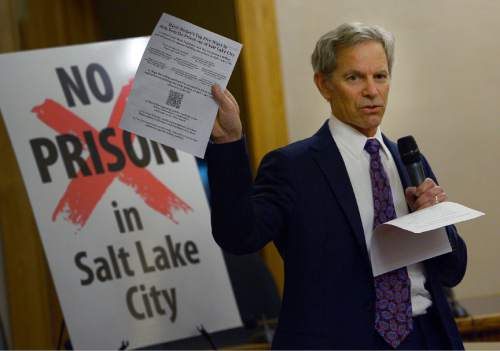This is an archived article that was published on sltrib.com in 2015, and information in the article may be outdated. It is provided only for personal research purposes and may not be reprinted.
Salt Lake City Mayor Ralph Becker has repeatedly told state lawmakers he doesn't want a new prison built in his city. And yet, if the state puts it there, he would finally catch a carrot he has chased for years — a sales-tax increase that would raise tens of millions of dollars to make up for the daily influx of commuters and tourists who stress Salt Lake City's resources.
In the final hours of its 45-day session, the Legislature added the sales-tax sweetener to a bill giving the Prison Relocation Commission until Aug. 1 to pick a site. None of the five areas on the short list wants the prison.
But Salt Lake City is the only one that would likely consider such a tax hike, which could not be larger than 0.5 percent and would not apply to big-ticket items like cars, planes or mobile homes. The other possible locations — unincorporated Tooele County, Grantsville, Eagle Mountain and Fairfield — have small populations, few visitors and few sales to tax. As Shawn Milne, a Tooele County commissioner, put it: "Why would I want to tax my own citizens for the privilege of hosting a state prison?"
Becker, on the other hand, expressed his support for the proposal in recent conversations with commission leaders, though he said "it certainly doesn't change our position on having the prison located in Salt Lake City."
The mayor, in an interview Friday, insists he didn't cut a deal with commission coChairmen Sen. Jerry Stevenson, R-Layton, or Rep. Brad Wilson, R-Kaysville, though he said he didn't try to dissuade the lawmakers from adding the sales tax provision to the legislation.
"We knew they were working on the bill, they told us they were looking for ways to try to address impacts on affected communities regardless of who they picked," Becker said.
Stevenson offered the amendment late Thursday with little discussion. The Senate approved it and the House quickly concurred, with no debate. That took place at least a week after the two commission leaders met with Becker.
Democratic state lawmakers who represent Salt Lake City's west side, including Sen. Luz Escamilla and Reps. Angela Romero and Sandra Hollins, were never clued in, and all three voted against the bill.
"No one from the city or the mayor's office contacted anyone from the west side," Escamilla said, "which is interesting if he was involved in those conversations."
House Minority Leader Brian King, also of Salt Lake City, said he didn't realize the optional tax hike was connected to the prison location until contacted Friday by a reporter from The Salt Lake Tribune.
"It is like the ground is being prepared for the decision to move [the prison] to Salt Lake," King said.
Stevenson and Wilson say that is not the case. While they added the provision after talks with Becker, they did so trying to address criticism from all of the locations from whose local tax rolls a prison could take 500 acres.
"We thought this would be a fair provision to put into this bill," Wilson said. "Whoever gets the prison will have the option to do this if they choose to."
"Salt Lake would certainly benefit from it much more quickly," Stevenson allowed.
The two lawmakers expressed sympathy for Salt Lake City's financial situation.
The capital city hosts a variety of federal and state government buildings, the University of Utah and dozens of properties owned by The Church of Jesus Christ of Latter-day Saints and other institutions that it can't tax. Becker estimates that half of the city's land mass is tax-exempt.
At the same time, the city is a tourist destination, hosts many conferences and is an economic hub luring commuters from nearby cities.
Becker said a tax increase would help defray the costs of roads, police and other services.
City Councilman James Rogers said no incentive from the Legislature will weaken his opposition to the prison, which would be in his district if the Salt Lake site is picked.
"Why don't they give it to Draper? Why don't they increase the sales tax there?" asked Rogers.
He declined comment on Becker's talks with the commission chairmen.
State leaders want to move the prison out of Draper to open that prime real estate near Interstate 15 for corporate development. They are searching for more remote land for a new prison, which would cost more than $500 million to build.
Kyle LaMalfa, the other west-side Salt Lake City councilman, doesn't think it is fair to put the prison in the same area as six halfway houses and a parole violator center.
"Frankly, I'm a little offended that the Legislature and the state of Utah find it permissible to put all of this stuff in the same place," he said. "It is really too much for our community to bear."
Wilson said the state's decision will be based on objective factors. A team of consultants are analyzing each location to see how much it would cost to install utilities such as sewer lines and electricity and whether there are any environmental concerns. The Salt Lake plot is near the wetlands of the Great Salt Lake, which could be problematic.
The Legislature is expected to vote on the commission's recommendation in a special session this fall.
Twitter: @mattcanham



